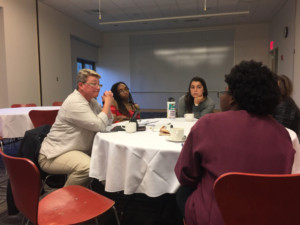Across the country students, professors, pundits, and politicians are arguing what does and what does not to constitute free speech, as well as what official stances universities should take on the matter. Bates College, however, is not shying away from these tense yet important topics. On Wednesday November 1, Professor Margaret Imber led a “Free Speech Salon” with several professors, staff, and students in attendance.
According to Imber, “members of the faculty have formed a committee and are working on a statement of principles on free speech,” which they hope to propose by winter’s end. “Whatever formulation the Faculty ultimately approves will have an effect on campus. The Salons are opportunities for students and staff to provide insight on how formulations might affect them and to provide the faculty with the benefit of their thinking.”
Each table was given the exercise to act as Bates administrators and decide how they would react to a hypothetical free speech crisis on campus. Wednesday’s crisis was inspired by news stories about free speech controversies that Imber had tracked down.
My table consisted of Imber, Professor Myra Wright, Nick Morgoshia ’21, and two other patrons who asked to remain anonymous, whom we will call D and M. Our scenario consisted of events that took place after a homophobic incident between two students. OutFront plans a protest in front of Lane Hall, which leads to a white supremacist militia from Lewiston accompanied by a group of Bates students to counter-protest, which subsequently leads an Antifa group from Portland to arrive on campus to join OutFront. Our job was to decide if the off-campus groups should be allowed onto Bates property, if any protests should be allowed to happen at all, and what statement, if any, Clayton Spencer should make post hoc.
Imber caveated the talk by stating that “Bates has no policy on outside groups coming onto campus, but we are a private institution so we could simply kick them off.”
Much of the conversation was contingent on the violence the white supremacist militia and Antifa group would undoubtedly incite. For M, “the pivotal part remains outside groups coming onto campus. From a free speech point-of-view for groups on campus, it doesn’t really matter.”
D later added that Bates would have the responsibility to distinguish between the ideologies of the groups coming onto campus. For him, it “isn’t just a simple difference of opinion. These are the sort of views that are dangerous,” referring to the white supremacist views; “explicitly violent speech or not doesn’t matter, because the result is violence.” On this topic, it was mentioned how controversial speakers like Charles Murray have unintentionally incited violence at their speeches on campuses. Morgoshia then asked “should a guy like Murray be invited,” even though he would not be as explicitly violent as the white supremacists or Antifa. To this, Wright rhetorically asked “what reason do we have for inviting them [Murray et al]. Are we there to listen, to learn, to engage?”
In the end, our table decided that all violence was unacceptable, and thus on campus groups would be allowed to protest outside Lane Hall while the white supremacist militia and Antifa would be forbidden. We also concurred that President Spencer should release a statement condemning the violence of the off-campus groups and state that Bates abides by freedom of speech. There was, however, disagreement as to whether or not she should distinguish between the ideologies and specifically condemn the white supremacists.
At the neighboring table with the same hypothetical, Charlotte Karlsen ’20 told me her group was called upon answer some big questions: “Were we [Bates] inherently created to serve solely those inside our classrooms, or the greater world? What value should we place on emotional wellbeing? Should the school be playing the offensive or defensive with predicting what material/language might be upsetting to the student body?” Despite these difficult questions, Karlsen said it was clear to her that “the student body and administration at Bates are fiercely committed to one another. This is a discussion we must be having because it defines what that commitment looks like.”
More Free Speech Salons will be planned for the coming months, so be on the lookout for opportunities to make your voice heard about how we should hear voices.









